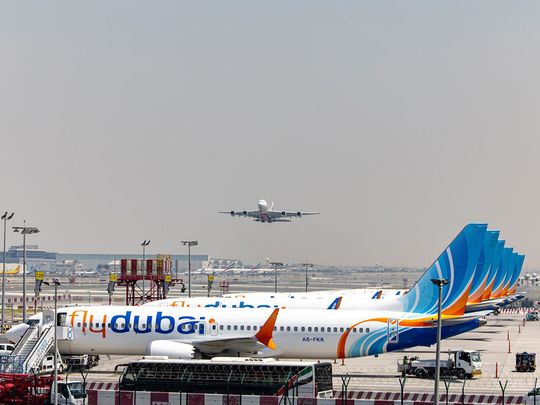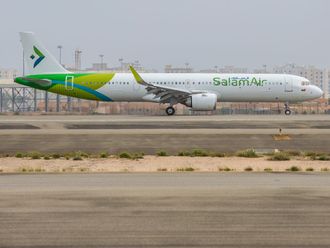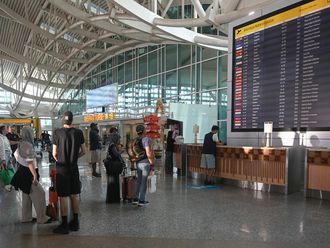
DUBAI: UAE airlines have cancelled and diverted multiple flights as airspace closures affected several parts of the Middle East late Tuesday, as tensions spiralled throughout the region.
Iran closed the airspace over Tehran after it launched a barrage of missiles at Israel on Tuesday evening. Flights at the capital's airport have been cancelled until 10 am Wednesday, the ISNA news agency reported Tuesday evening. Israel, Jordan, Iraq, and Lebanon have also closed their airspace.
UAE’s flag carrier, Etihad Airways, warned that shutting airspaces across the region will likely cause some disruption and delay in several flights over the coming days.
“Etihad Airways flights only operate through approved airspace; safety is always our highest priority, and we would never operate a flight unless it were safe to do so,” said the Abu Dhabi-based carrier. “This is a developing situation, and the airline is continuously monitoring security and airspace updates,” it said.
Dubai’s flagship carrier, Emirates, has cancelled all flights to and from Iraq (Basra and Baghdad), Iran (Tehran), and Jordan (Amman) on October 2 and 3.
“Passengers transiting through Dubai with final destinations in Iraq, Iran, and Jordan will not be accepted for travel at their point of origin until further notice,” the airline said in a statement.
Emirates has also cancelled several flights on October 2, including EK 837/838 Dubai Bahrain Dubai, EK855/86 Dubai Kuwait Dubai, and EK31/32 Dubai London Heathrow Dubai. The airline has also cancelled EK866/867 Dubai Muscat Dubai flights. Emirates has also cancelled flights between Dubai and Beirut until October 8.
“We continue to closely monitor the situation in the region and are in contact with the relevant authorities regarding developments,” Emirates said.
Meanwhile, Emirates’ sister concern – flydubai’s operations have also been impacted amid the escalating tensions. A flydubai spokesperson confirmed to Gulf News that due to the temporary closure of several airspaces on the evening of October 1, some flydubai flights have been impacted.
flydubai flight FZ 143 to Amman International Airport (AMM) and FZ 157 to Ankara International Airport (ESB) returned to Dubai. The carrier’s FZ 728 flight From Istanbul International Airport (IST) to Dubai International (DXB) returned to Istanbul.
Furthermore, flydubai flights to Jordan, Iraq, Israel, and Iran (except Bandar Abbas, Kish and Lar) were cancelled on October 2 and 3. “Passengers connecting to these destinations will not be accepted for their onward travel,” an airline spokesperson said.
“We continue to monitor the situation closely and amend our flight schedule accordingly. The safety of our passengers and crew is our top priority,” flydubai said.
European carriers take action
Meanwhile, European carriers Lufthansa, KLM, and Swiss have extended their suspension of flights to the Middle East. KLM spokeswoman Elvira van der Vis told AFP that "given the situation in the region," the suspension of its once-daily flight to Tel Aviv has been extended until the end of the region", spokeswoman Elvira van der Vis told AFP.
In August, The Dutch airline announced that it was suspending flights to Israel until October 26. Also, on Tuesday, German airline group Lufthansa said it was suspending flights to Beirut up to and including November 30.
Lufthansa group flights to Tel Aviv will be cancelled until October 31, and trips to Tehran will remain cancelled until October 14.
"We regret the inconvenience caused to our passengers," the group said.
Later on Tuesday, the Lufthansa group said that it had also decided to "avoid Iranian, Iraqi and Jordanian airspace up to and including October 2" and that "flights will continue to avoid Israeli airspace up to and including October 31."
The Lufthansa group—whose carriers also include Swiss International Air Lines, Austrian Airlines, and Brussels Airlines—has repeatedly modified its flight schedule in recent months due to heightened tensions in the Middle East, as have other airlines.
Following its parent company's example, Swiss said the extension of its flight suspensions was "intended to provide more predictability for both our passengers and our crews".











